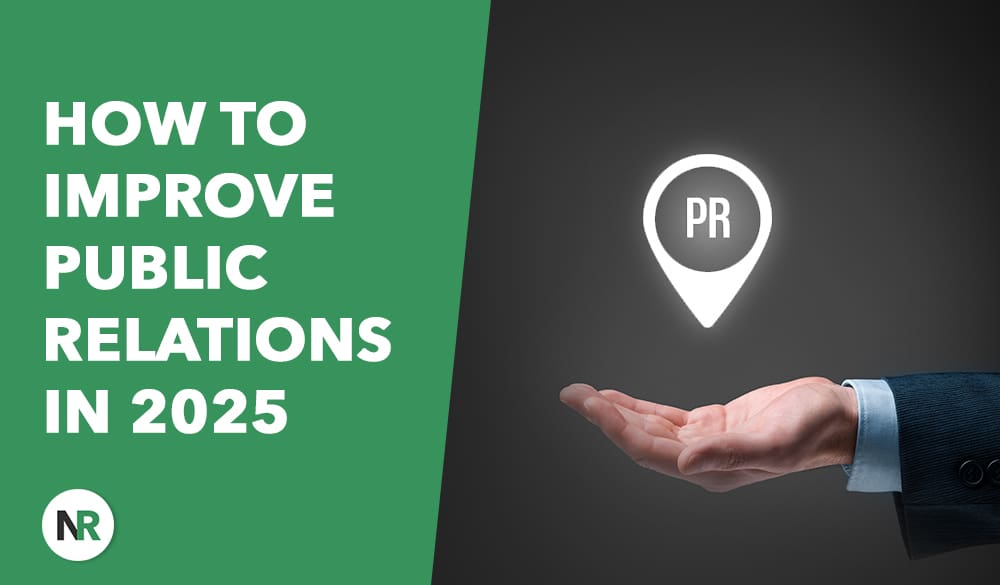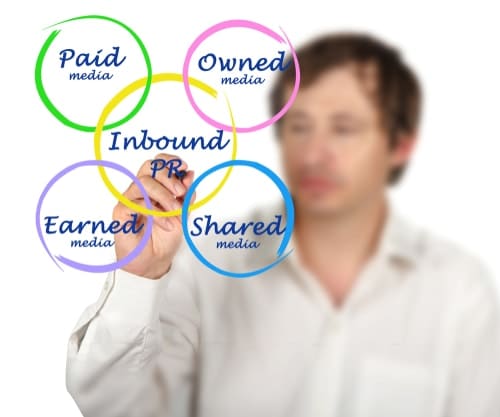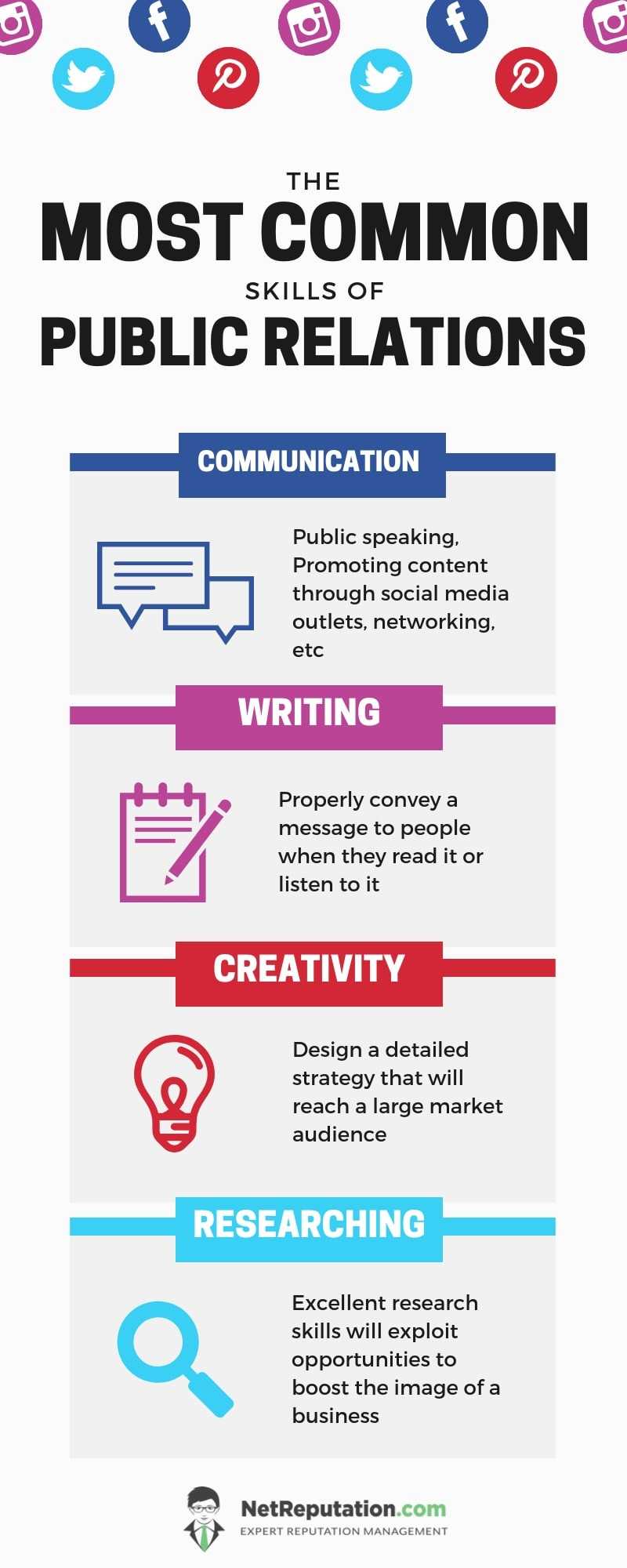Do you have a public relations strategy? Are you looking to expand your business opportunities, develop a strategic communication process, and show your brand to an audience that will be most interested in what you offer?
Say “hello” to public relations.
Public relations (PR) refers to the way a company communicates and builds mutually beneficial relationships with people. It’s how a company markets its brand.
In this article, we’re going to discuss how public relations differs from branding and marketing, the benefits of creating a public relations strategy, and more.
NetReputation can help you with your communication and public relations strategies, allowing you to reach new customers as you reinforce or repair your online reputation. Call us at 844-461-3632 or fill out the contact form below for more information.
[postform]
Public Relations vs. Branding
Both branding and public relations communicate with a target audience. However, how they go about this communication is where the main difference lies.
Public relations is heavily focused on techniques like:
- Communication management
- Online reputation management (ORM)
- Shaping the public opinion
On the other hand, branding is much more visual, relying on visual elements like color schemes and logo designs.
Whether you’re talking about public relations or branding, though, it’s all about sending a positive message to the public about your brand.
Public Relations vs. Marketing
Although marketing and public relations strategies are very similar in their approach, each one has different goals.
The main goal of public relations is to boost the reputation of your brand through different strategies. This doesn’t always translate into more sales, and it typically includes indirectly promoting your brand through activities like press release writing or speaking at industry events.
On the other hand, the main goal of a marketing campaign is to boost sales. Instead of improving someone’s perception of your business, marketing teams focus on driving revenue and increasing profits.
Public relations and inbound marketing are closely related, and using them together can achieve the best results. When you invest in marketing, hiring public relations specialists is the next logical step on your journey to gaining improved visibility and brand awareness.
Remember, people don’t buy products — they buy brands.
If someone is willing to buy your product thanks to your marketing strategies, it means they’re already connected with the brand through public relations efforts like press releases, media outreach, and social media engagement.
Put together, marketing and public relations strategies are the perfect combo for business success.
How Do Public Relations Efforts Improve My Company’s Reputation?
Working hand in hand with branding and advertising, public relations efforts are an extension of your company culture, giving you the opportunity to influence the public perception of your business, your products, and your services.
Whether you opt for a traditional press release or engage with followers on social media platforms, public relations specialists are able to bolster your positive brand reputation. Effective public relations strategies incorporate many factors that tell others who you are, what your company stands for, and how you serve your customers. This information helps to build or reinforce positive relationships between you and your audience.
Public relations specialists have a number of strategies for creating a positive public image, including:
- Creating a strategic communication process
- Managing both customer relations and media relations
- Positively influencing the public perception
- Preparing for and managing crisis communications
- Conducting market research to offer competitive public relations services
Remember that your online reputation is a critical aspect of your business. A favorable public image builds mutually beneficial relationships and gives you a competitive advantage. With a strong and positive reputation, you can attract customers, build trust and authority in your industry, and share your brand story by showcasing your core values.
You can take control of your online reputation, whether you’re working on your personal reputation or your professional digital presence. Call us at 844-461-3632 for more information.
3 Types of Public Relations Campaigns
Public relations specialists tend to focus on three distinct categories of PR: owned, paid, and earned media.
Each one of these public relations categories works toward the same reputation-building goal, but each method requires different strategies and action plans to reach that goal.
For public relations specialists to have an effective PR campaign, they optimize the three types of media in the following ways.
1. Owned Media and Public Relations
Owned media is the most important type of public relations media. That’s right, the most important!
Owned media is any content that your business controls, such as:
- Blog content
- Social media posts
- Website copy
Developing owned media is often a go-to strategy for businesses looking to build a public relations campaign. It can enhance your brand’s public perception by showing what you stand for.
You should focus on this type of media because you have the most control over it, making it the best representation of your brand.
Furthermore, people writing about your personal brand or products will often reference this media in their own coverage, making it a valuable asset to control. As a means of fostering community relations and shaping public opinion, owned media is the ideal solution.
2. Paid Media and Public Relations
A common standard in the marketing world and a must-have element in any digital public relations strategy, paid media refers to paying to make your content more visible.
Used by different online reputation management services and public relations specialists to promote media generated by the business itself, this form of media can be done through different services:
- Social media advertising
- Influencer marketing
- Native advertising
- Pay-per-click (PPC) ads
Financial investment in digital PR content is becoming increasingly popular because, through paid media, you can communicate your key message to more people. Just like owned media, paid media improves community relations and builds mutually beneficial relationships between you and your customers.
Since the majority of social platforms are reducing organic reach for business accounts, it’s a great way to make sure your content gets to its intended audience — the exact people you are trying to reach.
3. Earned Media and Public Relations
This type of public relations strategy can be done through news media, social media or word of mouth.
Defined as a tactic to boost the conversation and public opinion surrounding your brand, earned media often stems from owned media as more people talk about your business online.
Examples of earned media include:
- Your product is reviewed on an industry blog
- Your brand is praised in customer testimonials on social media
- Google ranks your brand above your competition
Keep in mind, though, that earned media is the hardest kind of digital PR strategy to execute.
It takes the most time and effort, and it’s best left in the hands of public relations specialists. With resilience and dedication, though, earned media can be the best way to build your business reputation and positively shape public perception.
Additionally, media mentions of your brand online or industry news shared on your behalf have the benefit of improving your search engine optimization (SEO) by boosting your visibility in search results.
What Is Inbound PR?
Many public relations specialists will tell you that inbound PR has been rightly named the future of the industry.
An inbound PR strategy has three main stages:
- Attract interested consumers
- Engage them so they stick around
- Delight them to gain their business and loyalty
In other words, inbound PR moves members of your target audience through the cycle of getting them to notice your brand, generating leads, nurturing those leads and then gaining them as customers.
One of the reasons why public relations specialists value inbound PR is because it lets them see exactly where the strategy needs to be fixed. Wherever the PR cycle is getting stuck — attracting new leads, nurturing them to keep them interested, converting the into customers — is where improvement needs to be made.
The best public relations firms know that inbound PR is a dependable and reliable way to build your brand, generate leads, and convert those leads through your public relations strategy.
What Does a Public Relations Manager Do?
As public relations specialists, PR managers enhance brand content and supervise the development and proper execution of your business’s PR strategy.
The typical day in the life of a PR manager, no matter if they’re working in-house or as a contractor, consists of strategizing content to promote the image of a particular business.
Standard day-to-day tasks of public relations specialists can vary greatly but mostly focus on:
- Writing press releases to share company-related information.
- Creating fact sheets about the company to be sent to media teams to build their brand.
- Providing media training to both in-house and external teams.
- Speaking at business events to showcase authority.
- Finding and analyzing media coverage in order to promote that content through owned and paid media outlets.
- Attending industry events to positively represent the brand at trade shows, recruiting events, etc.
At NetReputation, we work with individuals and businesses to help them build and take control of their online reputation. Give us a call at 844-461-3632 to learn more.
What Skills Do Public Relations Specialists Need?
Successful public relations specialists not only have foundational skills, but they are also skilled in public speaking and media relations.
The following skills are essential for public relations specialists and those in public relations departments to succeed:
Great Communication
Public speaking, promoting content through social media outlets, and networking all require great communication skills and are essential for building your business’s reputation.
Public relations specialists will spend the majority of their time effectively communicating and promoting a business. That’s why excellent communication is such a valuable skill for any PR manager to have.
Writing Skills
Besides having valuable communication skills, public relations specialists should also be well-versed in writing.
Writing press releases and company-related news requires writing skills that are able to properly convey a message to people when they read or listen to it. That is why PR managers must possess impeccable writing skills if they are to effectively promote a business.
This is especially important when PR managers promote their business through blog posts, website content, and press releases. To get the most social media engagement, well-written content is crucial.
Creativity
Just like in marketing, creativity can go a long way in the public relations world when looking to promote a business.
The most effective PR managers are creative and also know how to build the right PR strategy to reach a wide audience.
Not only will creativity help PR managers in “boring” industries, but it will also drive earned PR coverage. If you can craft a unique spin on a story, it will attract a wide audience that will be engaged in what you have to say.
Strong Research Skills
An important part of a PR strategy is based on researching and understanding how people communicate. Exploiting these findings can boost the image of a business. Every strategic communications process is built on a foundation of audience research.
PR managers will also need to do research when planning their strategy. For instance, they might need additional information, statistics, case studies, and data points to boost the power of their owned media, for which strong research skills are essential.
The Goals of Public Relations Campaigns
Goals are the measure of success for any PR campaign. Here’s a list of key performance indicators (KPIs) that you should always track when determining the effectiveness of your PR strategy.
Brand Mentions
Brand mentions occur when someone mentions your brand online — this makes them part of your earned media coverage. (The best brand mentions will have backlinks that guide your audience back to your owned content, so tracking backlinks is also smart.)
Brand mentions are great for promoting brand awareness, but there’s just one particular issue with brand mentions: They can be difficult to track.
Fortunately, tools like Google Alerts and Mention scan the internet for any references for your business’s name. These online tools can help you find out how many people are talking about your brand and the platforms they’re using. Usually, a high number of brand mentions means you’re running a successful PR strategy because your brand is receiving word-of-mouth marketing.
However, people talking about a brand does not always translate into instant success. Negative brand mentions can harm your online reputation. That’s why understanding the context of the mentions is important.
Who is doing the talking is also important. While traditional media plays a vital role in PR, media influencers on social networks have gained value in the PR industry, too. Media influencers have an outsized effect on social media due to their large audience base.
Furthermore, search engines pick up on these mentions by influencers, which impacts rankings in search results. In the event that negative brand mentions are rising to the top of search results, it’s important to know how to suppress that unflattering content.
NetReputation provides information and services to help you protect your digital presence. Call us at 844-461-3632 to learn more.
Reputation Score
You can effectively manage your brand’s reputation with a solid PR campaign. From a simple press release to a more comprehensive set of initiatives for earned and paid media, visibility in the online environment influences customer purchasing decisions. If you are able to build a positive reputation with your target audience, new opportunities for business growth and revenue present themselves.
Conversely, if your reputation is negative, you may be missing out on these opportunities. As a core component of media relations, PR works to rebuild or repair a reputation damaged by negative information in search results.
Site Traffic
Signs of a successful PR strategy campaign are people positively discussing your brand and visiting your site through earned media.
To replicate the success of your previous PR campaigns, track the number of visitors who have visited your site compared to your previous campaign. Do the research to figure out where they came from (for example, was it a particular piece of coverage?) and aim to replicate this success in your future PR campaigns.
New Customers
It is difficult to measure exactly how many new customers come as a result of your PR campaign. To see where customers came from, you can survey customers after they made a purchase and ask them where they heard of you. You can also use Google Analytics conversion paths to find their route to purchase.
For brands that don’t see an immediate influx of conversion-ready site traffic, don’t get discouraged — it can take time to see results.
Also, if you were successful in attracting new customers and increasing sales in your previous campaigns, investigate and research in order to produce the same positive results.
A Word About Corporate Responsibility
In today’s modern business environment, where a company stands on social and environmental issues can have a profound effect on consumer behavior. This is referred to as social and corporate responsibility. In essence, ethical business practices are a must-have for modern business owners; customers demand this type of corporate stewardship.
PR allows companies to share their positions on these issues with a target audience. For example, you can share your company’s work in adhering to environmental responsibility practices with a story about achievements your team has made in reducing waste or eliminating environmental hazards.
Social responsibility takes many forms. For modern companies, a policy of inclusivity and fairness in business functions can help build or support your online reputation. Among public relations tools in the private sector, being responsible in social, environmental, and corporate practices has tremendous value.
A quality PR firm will leverage your brand’s participation in these efforts via marketing materials like press releases and media events.
Public Relations Strategies and Tools
If you are looking for PR guidance or a way to improve your PR skills, consider these helpful resources below:
- CoverageBook: Use this tool to find and collect any coverage of your PR content. It’s a great tool for PR agencies that are building coverage reports for their clients.
- Mention: This tool tracks who’s mentioned your brand in earned media coverage.
- Monitor Backlinks Tool: This tracks who’s mentioned your brand in coverage and has included a backlink to your site.
- Muck Rack: This website collects details of media professionals who might be interested in covering your PR story.
- PR Fire: Take tedious PR tasks off your hands. This is a fantastic tool for in-house teams who are doing their own PR.
- Agility PR Solutions: This service provides a powerful yet easy-to-use media database, plus monitoring and analytics solutions to help identify and connect with influencers, capture coverage, and measure impact.
We offer ORM solutions for individuals as well as businesses. Call us at 844-461-3632 to get started today with a free consultation with one of our experts.
Contact NetReputation Today
PR is an ongoing, long-term strategy, not a one-off task. And as with anything that takes dedication, it can take a while to see results. One press release will start you on the road to a strong reputation and greater visibility, but only time and hard work will propel you to the next level in your business.
With a solid strategy and a commitment to learning the ins and outs of PR, you’ll see more brand mentions, backlinks, and general buzz.
Contact us today and let’s get started on making your brand memorable. Call NetReputation at 844-461-3632 or fill out the form below to receive a free consultation.



